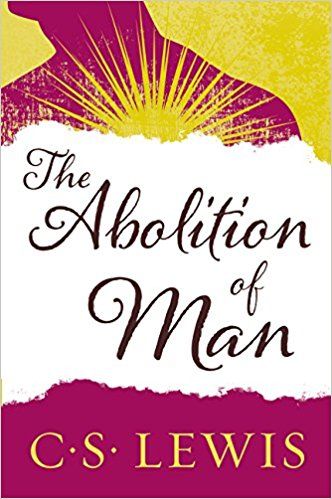
A Bit of Lewis
Many have heard of C. S. Lewis due to his creation of the Narnia books. Others may have also stumbled into Peralandra, or Out of the Silent Planet, or some of his non-fiction, even if guised as fiction, such as The Screwtape Letters.
This is the first time though that I’ve gotten around to reading The Abolition of Man – and I wish I’d read it sooner.
Perhaps it is because I’ve been digging through so much of Jordan Peterson’s work, or because I’ve listened to the Moleneux interview with a post-modernist, but from the opening pages, it’s obvious exactly what Lewis is about to examine, and tear apart.
In their second chapter Gaius and Titius quote the well-known story of Coleridge at the waterfall. You remember that there were two tourists present: that one called it ‘sublime’ and the other ‘pretty’; and that Coleridge mentally endorsed the first judgement and rejected the second with disgust. Gaius and Titius comment as follows: ‘When the man said This is sublime, he appeared to be making a remark about the waterfall… Actually… he was not making a remark about the waterfall, but a remark about his own feelings. What he was saying was really I have feelings associated in my mind with the word “Sublime”, or shortly, I have sublime feelings.’ Here are a good many deep questions settled in a pretty summary fashion. But the authors are not yet finished. They add: ‘This confusion is continually present in language as we use it. We appear to be saying something very important about something: and actually we are only saying something about our own feelings.’
He spends a few pages discussing exactly why this is important, but to those who are familiar with the reality-denying dreck that is post-modernism, that line is as blatant a sign as something covered in neon on the Vegas strip.
Not much further, he discusses their pedestrian takedown of an advertisement – I learned a new word, “bathetic” – and the unimaginative and literal nature of their critique.
…that it falls equally flat on those who are above it and those who are below it, on the man of real sensibility and on the mere trousered ape who has never been able to conceive the Atlantic as anything more than so many million tons of cold salt water.
In this, he touches on something that was a critical theme of Hogfather by Terry Pratchett. That there is more to life than mere materialism and matter. That the thing rising up in the east isn’t just a ball of fusion-fired hydrogen, but the sun, with all of the mythos and awe wrapped up in that. That the world would end not because the material in it would disintegrate, but because it would lose meaning. And myth, and poetry.
In a way, despite how myths are passed on, changed, and interpreted, despite the different perceptions of events we can have that provides the kernel of truth underlying the pointlessness of post-modernism, this is as anti-postmodern a statement as one could imagine. That the Atlantic is more than so many millions of tons of cold salt water, and that it means something.
The the modern concept recently springing into being that things and ideas are not in and of themselves worthy of humble appreciation, or awe, or disgust, or disdain, not independently “real”, is the precursor to the full-blown post-modernism that would spring forth in the later half of the century.
Gaius and Titius, while teaching him nothing about letters, have cut out of his soul, long before he is old enough to choose, the possibility of having certain experiences which thinkers of more authority than they have held to be generous, fruitful, and humane.
Like Death said in Hogfather, the sun would not rise – just a ball of gas.
